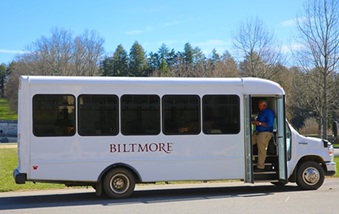 ASHEVILLE, N.C.—As the hospitality industry seeks to become more environmentally sustainable, a critical part of hotel and resort operations is coming into play outside the lobby doors—vehicles. From passenger shuttles to maintenance and groundskeeping trucks, these businesses depend on reliably powered fleet vehicles to transport guests from point A to point B and to keep operations running smoothly in the background.
ASHEVILLE, N.C.—As the hospitality industry seeks to become more environmentally sustainable, a critical part of hotel and resort operations is coming into play outside the lobby doors—vehicles. From passenger shuttles to maintenance and groundskeeping trucks, these businesses depend on reliably powered fleet vehicles to transport guests from point A to point B and to keep operations running smoothly in the background.
At the famous Biltmore Estate near Asheville, N.C., this effort is well underway. The 8,000-acre estate hosts over a million visitors annually and is famous for its breathtaking mansion and stunning landscape, in addition to a variety of lodging options, restaurants, and other attractions. To maintain operations, the historic destination relies on a fleet of bi-fuel propane autogas shuttles, trucks, and other vehicles. Propane autogas not only provides reduced emissions, but it also offers a comfortable and reliable ride for guests with the benefit of lower operating costs.
A More Sustainable Fleet
Shane Williams, the fleet manager at the Biltmore Estate, helped to create the Biltmore Fleet Sustainability Plan and Guidelines. It reads, “Our mission is to ensure the safety and comfort of our employees and guests while creating a fleet that is environmentally responsible, cost-effective, and socially responsible, through the implementation of sustainable transportation practices and technologies, to minimize our environmental impact and reduce our operating costs.”
To accomplish that mission, the Biltmore began adding propane autogas vehicles to its fleet in 2012. Today, it includes 19 Ford F-53 and E-450 guest trolleys and shuttles, two Ford Transit Wagons that are used as employee passenger vans, and six Ford F-150s used by horticulture, housekeeping, engineering, security, and farm operation crews. The bi-fuel engines are designed to primarily run on propane autogas with a back-up gasoline tank in the unlikely event that propane refueling is unavailable.
Propane is nontoxic and won’t contaminate groundwater and soil, helping to maintain the Biltmore’s impeccable grounds, which include a vineyard, gardens, forests, wildlife habitats, and farmland. What’s more, propane is an approved alternative fuel under the Clean Air Act, and it produces significantly fewer greenhouse gas emissions than diesel, gasoline, and electricity in a wide range of vehicle applications.
Today’s propane autogas engines are 90 percent cleaner than Environmental Protection Agency standards, producing 96 percent fewer harmful nitrogen oxide (NOx) emissions than diesel and near-zero particulate matter (PM) emissions.
Lower Fuel & Maintenance Costs
For Williams and the Biltmore team, the decision to switch to propane autogas wasn’t just about sustainability, it was also a smart operational move.
“We chose to use propane for several reasons,” Williams said. “Propane is a cleaner-burning alternative fuel with a significantly lower carbon footprint compared to other fuels. In addition to being environmentally friendly, it also offers considerable cost savings per gallon and in maintenance costs for our vehicles.”
On a per-gallon basis, propane autogas can cost up to 50 percent less than diesel or gasoline. In 2024, the Biltmore Estate saved $116,000 in total fuel costs compared with the previous year. Most fleet owners also see a reduction in maintenance-related expenses due to a lower frequency of engine issues that often arise with conventional fuels. And because propane autogas is a clean energy source, it doesn’t create carbon build-up often seen in gasoline and diesel engines—meaning longer engine life with fewer maintenance issues.
Propane Infrastructure & Supplier Support
Another benefit of adopting propane autogas has been the ease and cost-effectiveness of establishing onsite fueling infrastructure. The Biltmore Estate installed its onsite propane fueling station in 2012 when it received its first bi-fuel vehicles. Williams worked with their local propane supplier, Alliance AutoGas, to install the infrastructure.
The Biltmore’s fueling station includes a 1,000-gallon fuel tank, dispenser, and a backup propane generator so there is less potential downtime due to power outages. The estate also receives several deliveries of propane a week to keep up with demand. Having onsite refueling has helped the Biltmore avoid downtime and inefficiencies that would have resulted from traveling off-site to refuel.
The Alliance AutoGas team also supported the Biltmore’s service technicians with hands-on training. Today, five of its service technicians are certified to install, repair, and maintain the propane autogas systems. If they aren’t able to quickly solve the issue, Alliance AutoGas is a phone call away.
“We already had an established relationship with our local vendor, Blossman Gas/Alliance AutoGas,” Williams said. “Their infrastructure, training, and technical support made the decision [to adopt propane autogas] even more logical.”
Improved Passenger Experience
Within the tourism industry, providing the best for your guests is a top priority. Propane autogas helps fleet owners achieve that goal by providing a ride that’s not only safe and clean, but more comfortable for passengers.
Because propane autogas reduces harmful emissions like NOx and PM, it provides cleaner air for passengers and pedestrians around the shuttle. These emissions are known to exacerbate respiratory health issues like asthma and bronchitis, according to the EPA.
Propane autogas shuttles also provide a quiet and comfortable ride. The noise level of propane autogas engines is significantly quieter than diesel, reducing noise pollution on the property and allowing drivers to better hear what’s happening around them. This not only provides a better experience for guests, but it enhances safety for pedestrians and passengers alike.
Propane autogas shuttles also provide a comfortable ride during colder months. Unlike diesel, which can gel in colder months and cause engines to take a longer time to warm up, propane autogas shuttles warm up quickly to provide passengers with a comfortable ride.
Another key component of the guest experience is reliability. If shuttles aren’t arriving on time, guests can become agitated when long lines start to form. With consistent vehicle performance and minimal maintenance-related downtime, propane autogas shuttles stay on schedule. This is especially important at a busy destination like the Biltmore Estate.
Future Alternative Fuel Adoption
The Biltmore Estate plans to continue expanding its sustainability efforts with more alternative fuel adoptions in the future. Every new vehicle acquisition is analyzed to see if an alternative fuel-powered version is feasible. The Biltmore plans to continue incorporating propane autogas vehicles—along with electric cars and B20 biodiesel—into operation to give its fleet a diverse and resilient mix of energy options.
Propane autogas vehicles have enabled the Biltmore Estate to lower its emissions, cut fuel and maintenance costs, and maintain operational uptime. The Biltmore’s decision to operate propane autogas bi-fuel vehicles across multiple departments shows how an organization can achieve sustainability, efficiency, and profitability while still providing guests with top-notch service. For more information on how propane autogas can transform your hospitality fleet, visit propane.com/fleet-vehicles.
About the Author
Joel Stutheit is the Senior Manager of Autogas Business Development at the Propane Education & Research Council. He can be reached at joel.stutheit@propane.com.






